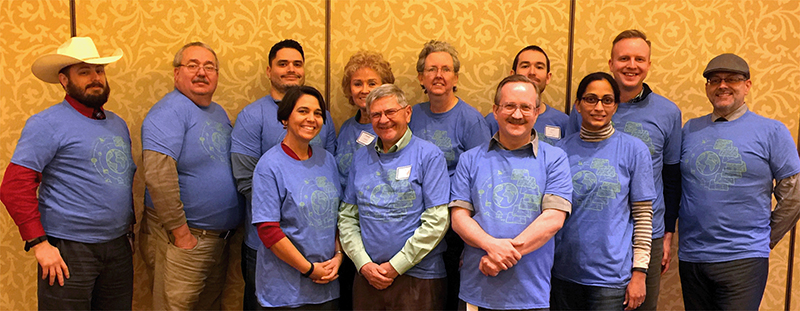Last updated on July 2, 2019
Developing skills in geographic information systems (GIS) can lead to a variety of career paths in government, real estate, public health, crime mapping, landscape architecture, community planning, logistics and so much more. Read more to get a better idea of the wealth of options available to students with an education in GIS.
What Is GIS Technology?
GIS technology uses specialized computer systems to get geographic data and integrate it into intelligent “super” maps. The data can then be used to create endless “what if” scenarios, providing a powerful tool for applications including:
- Cartography (map making)
- Emergency management
- Environmental sciences and security
- Forest and range management
- Homeland security
- Medicine and health care
- Real estate development and appraisal
- Social services
- Transportation
- Urban planning and development
- Water resources
In general, the term geographic information system describes any information system that integrates, stores, edits, analyzes, shares and displays geographic data.

Facebook and NASA: What GIS is Used for Today
GIS technology allows students to use satellite-captured data to show a variety of information about a specific location, such as environmental conditions, urban growth patterns or flood-prone homes. It takes measurements and shows a variety of map features such as boundaries and elevations. The technology also allows students to merge features from existing maps to become digital features.
Additionally, companies like Facebook use GIS technology in conjunction with their mission of making the world more open and connected by analyzing how people living in a particular area and determining how best for them to connect to the Internet. People living closer together, for example, may find short-range access networks like Wi-Fi hotspots are suitable, while cellular technology will work better for people living farther apart in more isolated areas. Facebook has even gone so far as to invest in and combine millions of maps to create their own map of the world as part of its population density analyzation efforts.
Another example of a real world GIS application comes by way of NASA, which has used GIS technology to study climate modeling, malaria and black rhinos. The three things may at first seem unrelated, but according to senior programmer analyst Joe Nigro, “The common factor is knowing how to use GIS. I’ve worked on a range of projects from plague modeling in the American southwest to semi-automating glacier boundary extraction in Alaska. I never know what I’ll be working on next. GIS opens up so many possibilities; it opened up the world to me,” said Nigro.
Why Is Geographic Information Systems Important?
Geographic information systems is important because it helps facilitate the discovery of trends and relationships based on geospatial information. “All of these maps show how we perceive and catalog our world,” said Scott Sires, Brookhaven‘s GIS program coordinator. “Data captured by satellites can be uploaded into GIS and show all kinds of information about a city, such as income, voting patterns or transportation networks.”
“We look for patterns and relationships,” Sires said. “For example, we try to determine if there is a pattern between crime and an absence of grocery stores. There are burglaries and thefts and violence, and we can measure the effect of the phenomenon on a particular area.”
Apply for Admission to DCCCD Today
How GIS Technology Makes a Difference in the World
GIS technology makes a difference in the world in part due to a wide variety of possible applications. Aside from trends and relationships, GIS skills can be useful for careers in real estate appraisal, retail, banking, natural resources management, emergency management and more. For things like real estate, retail and banking, GIS can mean improved decision making for business owners. In natural resources management, it can mean improved transparency from government officials, or help identifying at-risk or under served populations within a community. For emergency management, it can mean identifying weaknesses or improving communications during a crisis.
How to Learn Geographic Information Systems
Students of the Brookhaven College Geotechnology Institute learn through in-class and hands-on projects, with GIS classes primarily focusing on cartography, data acquisition and analysis, GIS applications and more. Brookhaven offers both a GIS certification and an associate degree program:
- Geographic Information Systems Specialist — Associate in Applied Sciences degree, which can be completed in five semesters as a full-time student.
- Geographic Information Systems Technician Certificate, which can be completed in four semesters.
How Much Do GIS Technicians Make?
With a GIS associate degree, you can expect an average starting GIS technician entry level salary in Dallas/North Texas of about $25,000 per year.
GIS jobs tend to be both analytical and visual and usually attract people who might also have an interest in data analysis, architecture, CADD, maps, programming, problem solving and more.
Here are some examples of job titles and salary ranges you might have with a GIS education in DFW:
GIS Titles |
Educational Attainment |
Median Annual Wage |
Can Also Include (But is Not Limited To) Job Titles Like |
|---|---|---|---|
| mapping technicians | bachelor’s degree | $41,724 | CAD technician |
| mapping technician | |||
| surveying technicians | post-secondary certificate or associate degree | $41,724 | survey technician |
| instrument operator | |||
| survey party chief | |||
| survey crew chief | |||
| instrument man | |||
| cartographer and photogrammetrists | bachelor’s degree | $60,736 | GIS analyst |
| GIS specialist | |||
| geographers | bachelor’s degree | $60,382 | GIS analyst |
| geospatial information scientists and technologists | bachelor’s degree | n/a | GIS analyst |
| GIS specialist | |||
| GIS manager | |||
| GIS administrator | |||
| GIS coordinator | |||
| geoscientists, except hydrologists and geographers | bachelor’s degree | $92,269 | geologist |
| geophysicist | |||
| geoscientist | |||
| project geologist | |||
| Sources: occupation titles, educational attainment and reported job titles: O*Net. Median annual wage: Emsi, 2017, Q1. |
|||
The educational attainment listed is the most typical, but there are exceptions. For example, geoscientists (except hydrologists) and geographers are the job titles/educations in this report that did not show people entering the field with an education below a bachelor’s degree.
- Find out more about DCCCD’s certificate and degree programs on our website.
